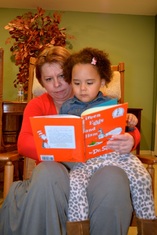From Our Educators
Debra Hasbrook, M.Ed. |
8/12/2014
Helping a child master the skill of toileting is different in a child care setting than in the home. At home you may have one or two children practicing this skill, where as in a child care setting you may have seven to fourteen children in a classroom, and toileting becomes one of the daily rituals. In the child care setting it is important to work with the families and respect their wishes on how they are working with their child to meet this milestone. The process can go awry if the child is practicing at home but not in child care or vice versa. The first step in beginning this process is to wait until the child is ready to practice toileting, somewhere around two years old. This is one area where power struggles can harm a child and stress out care givers. Adults generally begin this process because they think it is time, or for adult reasons. Children are in control of three things, eating, sleeping and toileting. When too much pressure is put on a young child to practice toileting it can cause emotional and physical problems such as delayed success in toileting and encopresis (When a child begins to hold the bowel movement) Forcing a child to sit on the toilet for extended periods and trying to convince the child to eliminate will not be productive or provide positive results. So how do you know a child is ready and what do you do? The signs of readiness include but are not limited to the following.
Begin slowly and make it fun. Get a potty chair or a seat that fits securely on the toilet with a stool for their feet. Sing a song or bring in a book to read. Make the event brief. Give the child the control. ask Amir “Are you all done?” Even if it has only been a few seconds let Amir get down, help him as he pulls up his pants, and wash hands. Don’t be surprised if he soils himself immediately after, this is very common. Don’t scold the child, just change him as this is the beginning of associating elimination and the process of toileting. This is Potty Practice. If Amir goes to the bathroom give him lots of praise and maybe do the Potty Dance. You may find that bribery and stickers will backfire, though many use them successfully. There is no specific time frame, though in the beginning you might try every half hour, some people try every fifteen minutes. Associate toilet practice with activities in the day; before or after meals, before and after nap, before going outside or a change in activities. Consider how you would feel if you were playing with your favorite toy or activity and you are forced to leave it to use the toilet. Try to choose times when the child is in between activities, or let the child bring it with her. This is responsive and respectful care giving. Some parents take their children to practice toileting when they go saying “It’s time for us to go potty.” Funny side note: I always took my four children to the restroom upon entering a restaurant or attending an event. Today as adults they still head to the stalls when they arrive at a destination. Be of good cheer! Though there may be an occasional accident, most children master this skill before going to Kindergarten. Resources:
|









